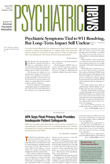Gauging increases in the prevalence of PTSD or depression associated with the events of last September 11 is not an easy proposition, given the difficulty of assessing individuals’ symptoms. Data on utilization of mental health services in the New York metropolitan area, however, show only a slight increase after that date, which quickly returned to preattack levels.
Robert Rosenheck, M.D., director of the Veterans Affairs Northeast Program Evaluation Center and a professor of psychiatry and public health at Yale School of Medicine, told Psychiatric News that VA data “suggest that the crisis reports are not being borne out.” There was every reason, given the literature on PTSD, Rosenheck said, to expect that veterans would have a difficult time dealing with the events of September 11. The data, though, did not support that expectation. Rosenheck analyzed service use for 19 days prior to and 19 days following September 11 at Department of Veterans Affairs facilities.
He looked at general daily visits as well as visits specifically for mental health concerns, and even more specifically for PTSD. General visits rose 6 percent, mental health visits rose 5 percent, and visits for symptoms of PTSD rose 4.3 percent following September 11. The increases, however, were actually smaller than for the same period in 2000, but larger than those seen in 1999.
Similar data were reported for military health facilities in the Washington, D.C., area by Charles W. Hoge, M.D., and his colleagues at Walter Reed Army Institute of Research. Hoge examined date on outpatient visits to behavioral health clinics for 22 weeks following September 11 and compared them with data from the previous two years. He found no increase in total visits, but did find an 18 percent increase in visits for “adjustment reactions” in adults following the attacks.
Anecdotal reports from the New York area tend to agree with the small amount of hard data available (
see story on page 1).
“The great majority of people we saw, whether they had been right under the buildings or far away, came in and calmed down after a session or two,” John Markowitz, M.D., associate professor of psychiatry at Cornell University Medical College, told Psychiatric News. Most of the patients, he said, had some pre-existing mood or anxiety disorder that was made worse by the stressors of 9/11.
Joseph Boscarino, Ph.D., a psychiatric epidemiologist at the New York Academy of Medicine, has limited data for nonmilitary mental health service use in New York City. In a random-digit dialing survey, academy researchers “did not find a major utilization increase among the general population during the early post-disaster period,” except among those who had symptoms suggestive of PTSD or major depression, he noted.
Overall, researchers agree, early reports of a mental health crisis following 9/11 have not been borne out in the year since.
